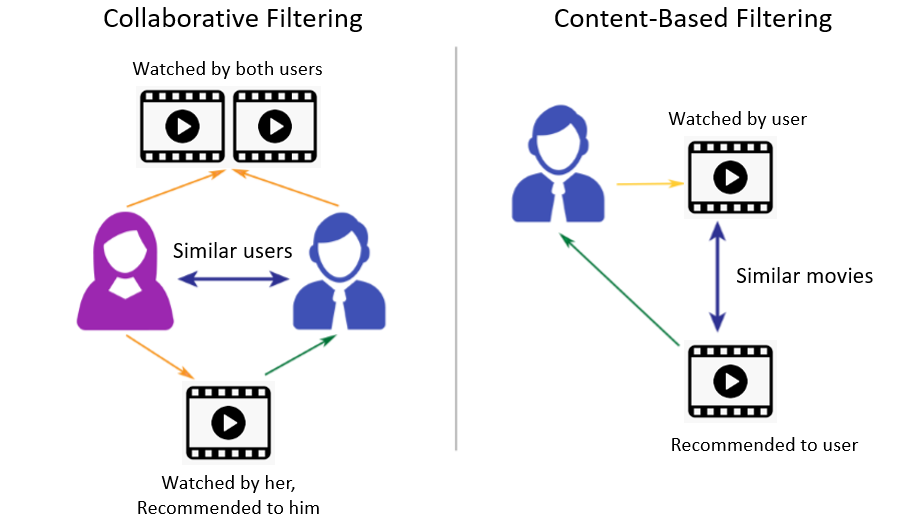Variety is the spice of life.
Having too much variety can get pretty confusing and frustrating.
Think about how it feels when you browse on Netflix for hours trying to figure out what show to binge on. (because you ignored all the recommendations).
A timely product recommendation saves time, eliminates confusion, and provides a positive customer experience.
So how can large ecommerce stores keep their customers from overwhelm and confused?
Three words. Product recommendation engines.
What’s a Product Recommendation Engine?
A product recommendation engine helps guide users on the products they should buy based on demographic data and previous shopping tendencies.
Product recommendation engines use algorithms and data to recommend the most relevant products to a specific user. They also use a filtering system that predicts and shows the items that the buyer may like to purchase.
Doesn’t that sound helpful?
Let’s explore what a product recommendation engine can do for your business.
What Do Product Recommendations Do?
Product recommendation engines support KPI’s and intangible goals of ecommerce businesses.
For example, if configured correctly, product engines boost revenues. Buyers are likely to buy more and make repeat purchases.
The result?
Your ecommerce business can experience higher Click-through-rates and conversion rates. These metrics positively affect customer experience, impacting intangible goals such as customer satisfaction and retention.
So are there different types of product recommendation engines? Or is it a one-size-fits-all?
Curious? Let’s explore more.
Types of Product Recommendation Engines
Collaborative Filtering
This filtering method is based on collecting and analyzing user information such as buying behavior, activities, or preferences. It involves predicting what they will like based on the similarity with other users.
This filtering method’s main advantage is that it can recommend complex items without understanding the object itself.
Collaborative filtering is based on the assumption that user behavior is consistent. That means that users are likely to choose similar items to what they chose in the past.
There are several types of Collaborative filtering:
User Collaborative Filtering:
In this case, the algorithm recommends products based on what similar buyers have chosen. While this algorithm is effective, it takes a lot of time and data processing resources.
This type of filtering would require the algorithm to pair off customers based on their information to work effectively. Therefore, it’s not ideal for ecommerce stores with large product catalogs or retailers with an extensive product assortment.
Item Collaborative Filtering:
While this type of filtering is similar to user-user filtering, the algorithm works differently. Instead of pairing off customers, the algorithm works to pair off products.
Once a buyer gets one product that’s determined to be “alike,” the algorithm recommends similar products to the buyer.
Think about how Amazon works.
Shoppers are shown related products when they search for a particular item.
This algorithm works faster and requires fewer resources. Customers are likely to find what they are looking for faster. It’s therefore ideal for large ecommerce stores.
Content-Based Filtering:
This filtering method uses cookies to track users over multiple visits.
This type of filtering analyzes user preferences (likes and dislikes), then makes recommendations based on this data. In a content-based recommendation system, the use of keywords to describe items is essential.
In this method, algorithms recommend products that are similar to what the user has liked in the past.
For example, think about Youtube recommendations. Youtube will recommend videos and content based on the kind of content a user has interacted with in the past.

Hybrid Recommendation Systems
Combining collaborative and content-based recommendations may be more effective for any ecommerce business.
You can implement hybrid recommendation systems by combining collaborative-based and content-based filtering. Collaborative and content-based predictions are made separately and then combined to create the hybrid approach. You can also unify the methods into one model.
For example, think about how Spotify curates the “Discover Weekly” personalized playlists. The recommendations made are based on what you like.

So how do they do this? Through a complex hybrid filtering method that collects data based on your listening habits and similar user’s listening habits.
Fascinating, isn’t it?
All three methods use AI-based algorithms to fuel the process and provide personalized product recommendations.
So, do product recommendation engines make sense for your business?
Product Recommendation Engines-Are They Good for You?
The short answer is a resounding YES!
Curious?
Here are some fantastic benefits you get from product recommendation engines:
Improves Personalization
Product recommendation engines help your business deliver customized and relevant content. These engines help brands personalize the customer experience and make suggestions based on their preferences.
A product recommendation engine allows you to analyze buyers’ visits to your website and their previous browsing history. This data is useful in delivering relevant product recommendations.
Shoppers feel known, and this results in a positive customer experience.
Enhance Sales and Average Order Value
Product recommendation engines encourage your site visitors to buy —and buy more. This allows your business to drive much higher conversions and enhance average order value. Relevant recommendations allow your customers to engage with your products in real time.
Relevant recommendations expose your site visitors to a higher volume of products that are likely to interest them.
The result?
Your visitors are likely to engage in impulse buying. Moreover, you can bundle up products. This can allow you to upsell or cross-sell products across various price and description categories.
When users find what they’re looking for and more relevant products, it enhances their customer experience.
It also doesn’t hurt your bottom line.
Product Recommendation Engines —The Build or Buy Debate
Product recommendation engines are suitable for your business.
So should you build a product recommendation engine? Or is it better to buy it?
The simple answer is to buy.
Why?
AI typically powers product recommendation engines. They also require semantic data and sophisticated content tagging capability.
It’s also expected recommendation engines will continue to evolve with time—it’s better to keep it all with experts.
Expanding Ecommerce Excellence with Zoovu’s Product Recommendation Engines
Enhancing Ecommerce Platforms with Advanced Algorithms
Zoovu leverages cutting-edge machine learning algorithms to transform the ecommerce experience. These algorithms analyze customer data and behavior, allowing ecommerce stores to deliver highly personalized product recommendations. By continuously learning from user interactions, Zoovu ensures that the recommendations remain relevant and timely, optimizing user experience and maximizing conversions.
Optimizing Customer Journey with Collaborative Filtering
Zoovu’s collaborative filtering technology refines the customer journey by suggesting products that similar users have enjoyed. This approach not only enhances the relevance of product suggestions but also fosters a sense of community and trust through social proof. For ecommerce businesses, this means not just improved sales but also increased customer loyalty as users feel their preferences are understood and catered to.
Driving Sales with Smart Cross-Sell and Upsell Strategies
By implementing strategic cross-sell and upsell techniques, Zoovu boosts average order value and overall sales. The platform intelligently suggests complementary and higher-tier products based on the customer’s current selections and previous purchase history. This method encourages impulse buying and discovery of new products, directly impacting the bottom line of ecommerce businesses.
Real-Time Engagement on Product Pages
Zoovu ensures that product recommendations are not only relevant but also delivered in real time on product pages and throughout the online store. This dynamic approach keeps the user engaged and makes the shopping experience seamless and intuitive. By presenting similar products and frequently bought together items, Zoovu helps retailers capitalize on the moment of interest, greatly enhancing conversion rates.
Personalizing Experiences with Content-Based Filtering
Through content-based filtering, Zoovu personalizes the shopping experience by analyzing individual preferences and browsing history. This tailored approach ensures that each recommendation aligns with the user’s tastes and interests, making every interaction on the ecommerce site feel uniquely personal and highly relevant.
Utilizing A/B Testing for Recommendation Optimization
Zoovu employs A/B testing to refine and optimize recommendation strategies continually. This allows ecommerce businesses to understand what works best for their audience, adjusting strategies in real time to improve user engagement and satisfaction. A/B testing helps in fine-tuning the engine to ensure that the recommendations lead to higher conversion rates and better customer retention.
Enhancing User Experience Across All Touchpoints
Zoovu enhances the user experience across all digital touchpoints, from the homepage to the checkout. By integrating personalized product recommendations throughout the ecommerce site, Zoovu ensures a cohesive and engaging customer journey. Whether it’s through email campaigns, social media interactions, or the main website, each touchpoint is an opportunity to deliver value and drive sales.
Building Customer Loyalty with Personalized Experience
Personalized experiences are key to building long-term customer loyalty. Zoovu’s recommendation engine adapts to user preferences over time, creating a shopping experience that feels personal and relevant. This ongoing personalization fosters a strong connection between the brand and the customer, encouraging repeat visits and long-term engagement.
Leveraging Data for Comprehensive Merchandising
Zoovu uses detailed customer and behavioral data to empower ecommerce businesses with insights that drive more effective merchandising strategies. Understanding user behavior and preferences allows retailers to tailor their offerings more precisely, enhancing customer satisfaction and optimizing inventory management.
Transforming Ecommerce with Artificial Intelligence
The backbone of Zoovu’s product recommendation engine is its advanced artificial intelligence capabilities. AI allows Zoovu to continuously learn and adapt, making smarter recommendations that evolve with market trends and consumer behavior. This proactive approach ensures that ecommerce businesses remain at the cutting edge, always offering the most relevant and engaging products to their customers.
By integrating Zoovu’s sophisticated product recommendation engines, ecommerce platforms can significantly enhance their customer experience, increase sales, and build a loyal customer base. Zoovu’s technology not only responds to current customer needs but also anticipates future trends, ensuring that ecommerce businesses stay ahead in a competitive market.
Embrace Your Future
Technology is continuously evolving. Do you want to scale or increase your product offering?
Product recommendation engines are crucial to the success of any ecommerce business.
The only way to engage with buyers is to communicate with each as an individual.
Partner with Zoovu today for the right expertise.
Embrace your future.

